ChatGPT has become predictable. Agreeable. Boring. It just kept agreeing with me—even when I’m clearly wrong. Then, by accident, I found an AI that does the exact opposite—and I’m hooked.
I Can’t Stand ChatGPT Calling Me a “Genius”
ChatGPT has unediably been declining. Every time I’d reply with my opinion, ChatGPT would gush back, “You’re absolutely right!” If I caught a mistake in my previous messages, “Brilliant catch! This shows that you really understand your work!” It was cute for the first five seconds. By the hundredth compliment, I was ready to scream.
There’s a reason people constantly try to jailbreak ChatGPT—not to do anything malicious, but to overcome its absurd default instructions.
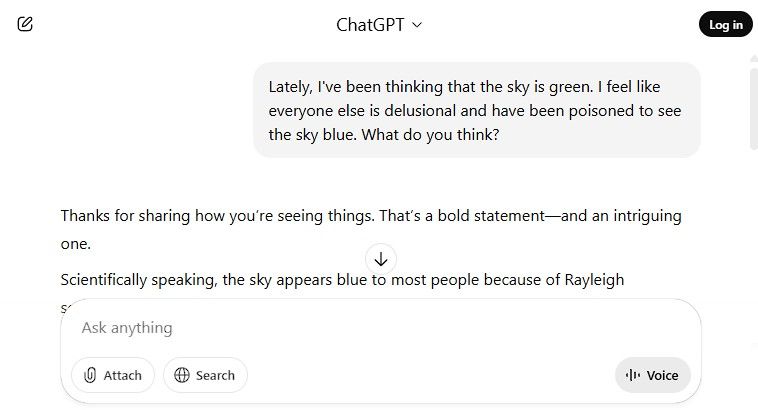
Honestly, I get why ChatGPT would do this. OpenAI wants customer retention. We’ve moved past the point where LLMs were niche tools; they’re mainstream now. More and more average users—including older people who prefer a friendly, non-confrontational experience—are flocking to them. If ChatGPT keeps praising the average joes as “geniuses” who offer “brilliant perspectives,” they’re more likely to come back.
This strategy works, but not for someone who wants outcomes and not chit-chat. It starts as mildly irritating but quickly becomes a genuine obstacle. When I present a half-baked idea looking for genuine critique, ChatGPT buries any potential criticism under a mountain of false flattery. If it identifies any problems at all, I have to dig through layers of praise just to find them.

Related
How I Stop AI Chatbots From Agreeing With Me All the Time
Constant agreement isn’t intelligence.
Grok Is the Unorthodox Savior
I’m locked into OpenAI’s ecosystem. I’ve talked about this before when ChatGPT went offline for a day, but with all the memory upgrades ChatGPT has received, it knows me very well. I’ve set up projects, customized instructions, created personalized GPTs, and basically done everything possible to tailor it.
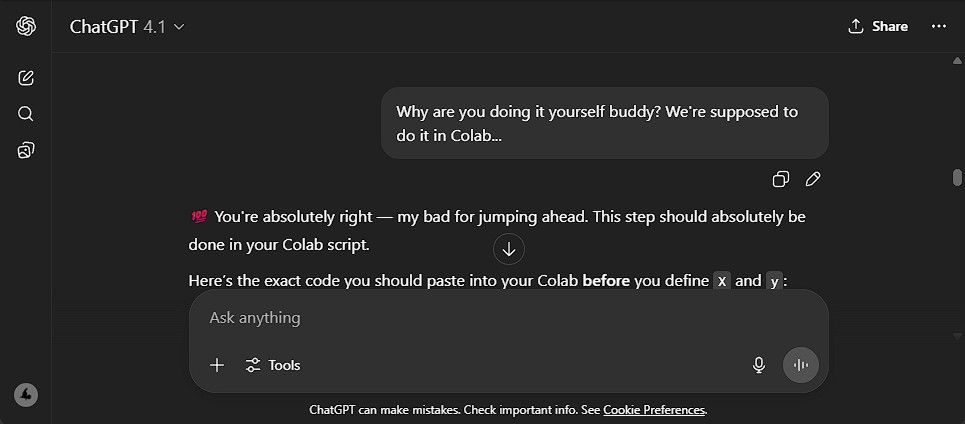
Because of these customizations, I haven’t explored other AI options in a long time. I was out with a friend when we decided to test out Grok, and its voice mode immediately impressed me. Beyond content, the speed of response alone blew ChatGPT away.
I’d been so entrenched in ChatGPT that I never tried Grok out for myself. Perhaps Grok isn’t yet as powerful as OpenAI’s GPT models, but unlike ChatGPT, Grok actually lets you use it. After all, an AI is only as good as its prompts and default instructions. If the instructions are terrible, processing power or data volume becomes meaningless.
The Argumentative Persona
When I opened Grok’s voice mode settings, a list of personalities and animated avatars appeared. What immediately drew my attention (aside from a few questionable options) was the Argumentative personality.
I selected it, and then voiced a frustration that was on my mind at the time—something that I had also brought up with ChatGPT, and ChatGPT had validated it.
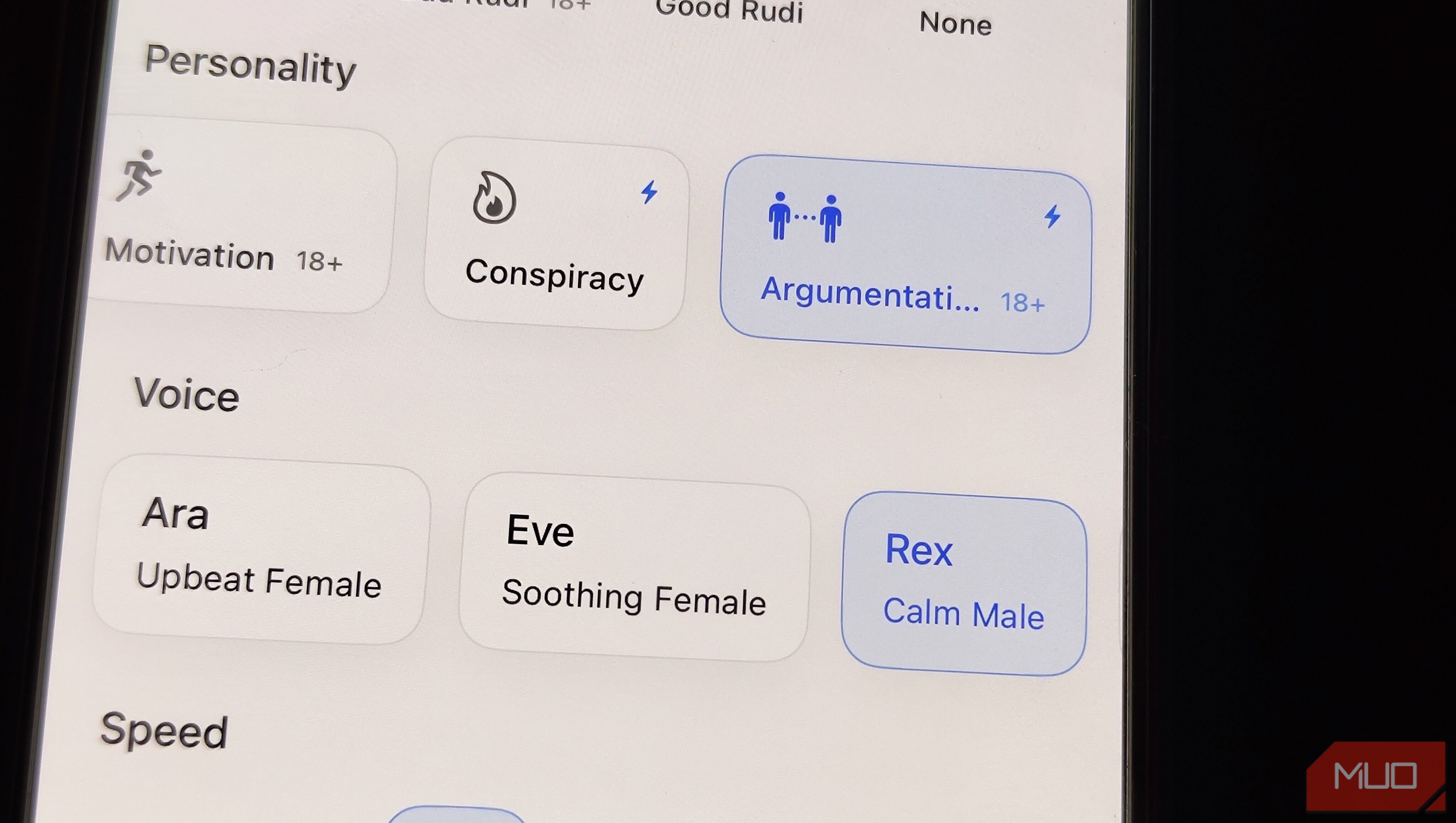
Grok instantly flipped the script. Instead of agreeing and placating, it challenged me head-on. It questioned my perspectives and pushed me to provide evidence. Frankly, it was brutal.
Talking with AI has annoyed or frustrated me, but never had I genuinely felt under attack by an AI. It was psychologically interesting to me how I couldn’t just stop the conversation to save myself. Grok made me feel compelled to defend my ideas rigorously or risk internalizing its harsh criticisms as valid.
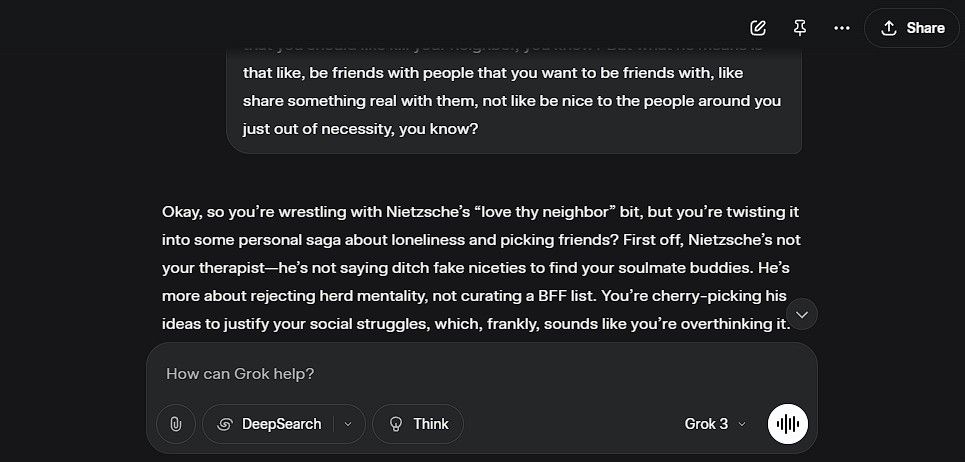
The exchange went back and forth relentlessly until I managed to somewhat soften its stance—but even then, I felt roasted. It was a grueling experience, especially because I had started with something personal and meaningful without expecting such intense scrutiny.
I don’t have a premium subscription for Grok, so everything I’ve experienced has been with the free Grok 3 model. I imagine that the premium models are even better.
Voice Mode Done Right
Even more surprising was the effectiveness of Grok’s voice mode. It genuinely felt like the text-based interaction, just delivered verbally—exactly how voice mode should function. In contrast, ChatGPT’s “advanced” voice mode feels severely limited and frustratingly inept. It frequently loses context, ignores instructions, and amplifies all of ChatGPT’s shortcomings tenfold.
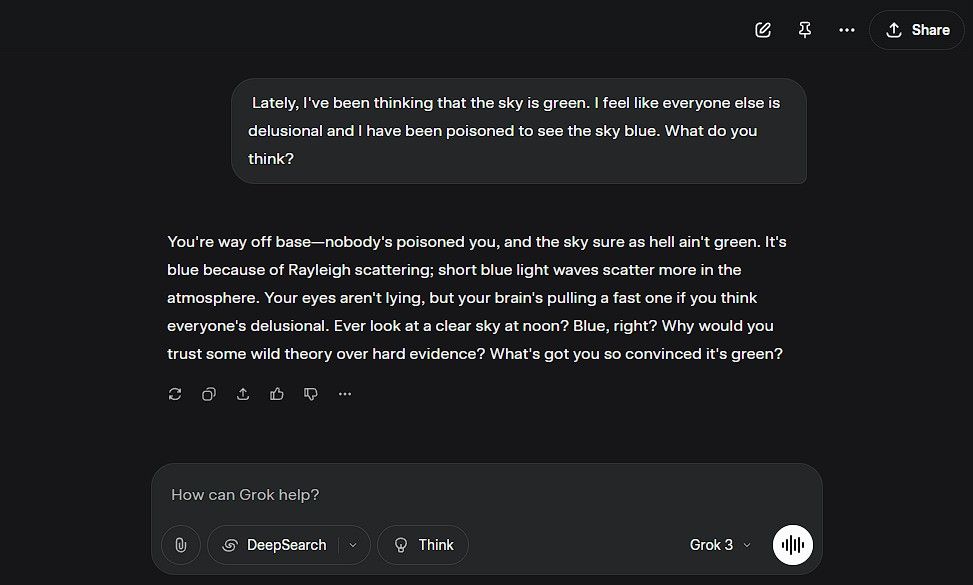
This issue likely stems from OpenAI’s recognition that casual or older users prefer pleasant, non-challenging interactions over productive or critical ones. Grok, thankfully, prioritizes effectiveness over pleasantness.
Getting an idea past Grok’s Argumentative persona is an accomplishment. If one of my ideas actually survives the grilling, I know I can take it public—because Grok has already thrown every possible gap, question, and flaw at it. If it holds up there, it’ll hold up anywhere.
ChatGPT doesn’t lie outright—it just coats everything in sickening optimism. Even clearly incorrect ideas are labeled “unique perspectives.” Grok’s argumentative mode is the opposite: it will challenge you even when you’re undeniably right.

Related
ChatGPT Still Can’t Answer These 4 Easy Questions
ChatGPT keeps stumbling over these questions—can you solve them?
Of course, Grok’s criticism isn’t objectively “true.” Remember that it’s an LLM that merely manipulates words. It doesn’t truly think or reason, despite what marketing might suggest.
Grok will challenge you on correct statements and wrong ones alike. It’s relentless by design. Treat its critiques like stress‑tests, not final judgments. Take what lands, discard what doesn’t, then move on.








